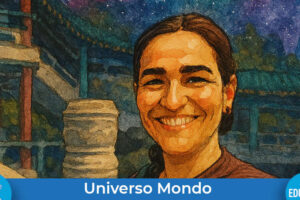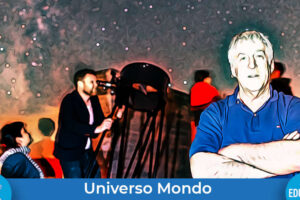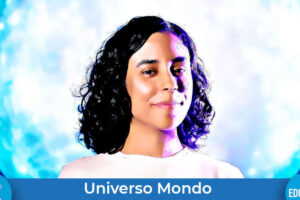Aggiornato il 28 Novembre 2024
With a little delay, Universe World is back with the last episode of the column for this year. In this interview, we meet Jean-Pierre Saghbini, mechanical engineer, astronomy enthusiast and outreach organizer from Lebanon, who tells us about the role and challenges of astronomy and public engagement in his country and beyond.

As usual in this column, let’s start by talking about yourself, your career and your passion about astronomy…
I’m a mechanical engineer and entrepreneur, I founded a construction enterprise in 2009. My relation with astronomy, well, it was my passion since I was a kid. We had the war in Lebanon at the time, so to escape from conflict areas we would go to the mountains: there was no electricity, we had no generators or solar panels like today, but the sky was amazing. I was 8-9 years old, 1400 metres above sea level. And to keep us away from stories of the war, my parents got me a little telescope, so I started to ask questions about what we were seeing, for example the Perseid meteor shower. My passion for astronomy started there.
This is a beautiful story, sad but very beautiful. How did this passion evolve?
After that, I looked into books, but unfortunately in Lebanon there was no astrophysics major. Because I loved physics, I went to what was closest, so mechanical engineering. I got a bit away from my passion because of work until 2014, when I decided to participate to the Astronomy festival in Fleurance, France, and later asked to create the same festival in Lebanon. For this reason I started the UniversCiel Liban association. We created a group of really passionate people to promote astronomy in schools, universities and to the Lebanese public.
What about today, is it possible to study astrophysics in Lebanon now?
Now there is a joint Masters in Astrophysics at two private universities. In 2009 astronomy was introduced as an optional course in two universities, unfortunately there are no research centres in this field though so graduates have to go abroad to do more research, for example to pursue a Phd, otherwise the only option is to teach at the university. And the curriculum needs to be updated, this is something we are trying to work on.

In your opinion, what is the role of astronomy outreach in all this?
From our experience with the association, by running lots of activities, we gained the trust of many institutions. Marc Zou Beid, who is an astrophysicist, introduced courses in the school where he is teaching: he succeeded when they saw the quality of the interventions of our association. They realised the importance of astronomy as a tool to understand more the topics they teach, especially in physics. So they allowed Marc to teach astronomy once a week at the school, even though it’s not part of the curriculum.
One of the association’s main activities is the Festival d’Astronomie de Fleurance au Liban. Can you tell us more about it?
The original festival started 34 years ago in Fleurance, a small town in the south-west of France. Here, we started it in 2015. The concept is a little bit different: in France, the festival takes place during the summer holidays, so families attend the festival and participate in the activities, conferences and talks. We changed the format: in Lebanon, the festival takes place in universities and we invite schools to come. Around 1500 students attend: there are a lot of workshops prepared by school students who explain their work to students from other schools, so it’s a meeting point for the youth. We also have European and Lebanese scientists who give talks on different subjects in astronomy, and also stargazing. The last day was a day of tourism for the scientists coming from abroad, including some interaction with the Lebanese public. This was the format for the first five years, then came the Covid pandemic, the financial crisis and the Beirut port explosion, so we changed a little bit the format into an outdoor festival for kids and families, with talks, art, music, Sun observations during the day and stargazing at night.

How do you combine your day job with all these other activities?
I don’t know! I have an amazing team, I delegate some of my duties to the team. I cannot thank enough the association team, they are amazing. All volunteers and from many different backgrounds: we have scientists, teachers, communicators, engineers, architects, artists. My heart is in astronomy. During the day I work mainly on the job, afternoon and nights are dedicated to astronomy and the family. 24 hours in a day is not much, we should have 36 maybe!
Since 2021, you also have been serving as Team Chair and Contact Person for the International Astronomical Union’s (IAU) National Astronomy Education Coordinator (NAEC) team for Lebanon. What does this role entail?
The IAU National Outreach Coordinator (NOC) for Lebanon saw what we are doing and they proposed us to join, there was no NAEC team in Lebanon yet. Since we joined, we started collaborating with international partners. I’m very grateful for that, it’s a very rich experience. And it gives us an official image, for example when we talk about curriculum with the officers at the Ministry of Education, this give us a certain credibility, it’s very important.

What kind of international collaborations have you set up so far?
The first activity we joined was a co-design started by the Office of Astronomy for Education Center Italy in 2022. We joined in March, they had started a few months earlier in preparation for a workshop in Lampedusa, and to be honest I didn’t quite understand the goals at the beginning. We would meet on Zoom and I was happy to share something with other people that have the same interests. Later I understood the purpose and goals of this co-design, among them having online resources for astronomy education in several languages of the Mediterranean countries. This is very important: often languages are a barrier for teachers. Now I have a different vision of what we started in Lampedusa. The following year, when we met in Ifran, Morocco, we were ready to exchange and share our experiences from Lebanon with other countries. Maybe we are doing the same activities in different countries, but the details might change and sometimes they make all the difference. Maybe I can take some details from a collaborator in a different country, to make my activities more interesting.
What do you bring back home from these international experiences?
To see there is people from different countries, listening to us and appreciating what we do, this is fuel for us. We need this for motivation. We have a lot of challenges, people have other priorities. Now we have activities published on Astro Edu, it’s the result of days and months of coordination, to refine these activities and make them more and more interesting for teachers and educators. To collaborate more on the curriculum and education, this will demand a lot of work and details, because the curriculum can be different from one country to another, but such a collaboration can lead to changes in the long run.
What would you say are the major challenges for astronomy outreach, in Lebanon and globally?
In Lebanon, we have a lot of challenges. First of all, we need to convince people of the importance of astronomy. Then we have economic challenges, the financial crisis. Making astronomy important for people is very hard. People’s minds are busy thinking about the education of their children, looking for jobs, for a good salary.
Globally, the challenge is to make astronomy as important as other major events, like sport events or big concerts. It will not be as appealing as a music concert, at least not for many people, but we need to make people aware that astronomy is not just about science. It’s also about imagination, our history, how we came to this world. When we discuss astronomy, we are not just talking about the stars, we are also talking about the Earth, how to prevent it from destruction. When we have half as many people as those who go to a big music concert, but listening to a scientific talk about astronomy, then we know we are doing a good job. Now, we are not. Not yet.

How do you think that different countries in the Mediterranean can collaborate in the field of science outreach?
What I can suggest is what we started in the Arab countries. We created a coordination group with all IAU offices in the Arabic region. We have a WhatsApp group of the Arab country NOC and NAEC teams, we had a lot of activities on Zoom during the pandemic. There are many astronomy festivals, why not creating a collaboration between festivals in the Mediterranean? We started organizing a joint stargazing event called “One thousand and one stars”, it was supposed to take place on the 21st October 2023 in 13 Arab countries, all looking at the sky at the same time. Unfortunately we had to cancel because of the current situation in the region.
Indeed, the war has been ongoing for over two months now in the Gaza strip, leaving many around the world, including scientists and astronomers, powerless and at a loss for words. With your experience of collaboration to promote a love for science and the night sky, is there anything astronomy can do to bring people together?
In times like those we are living, I remember quite well the words of Andrè Brahic, the French astrophysicist who discovered the rings of Neptune, whom I had the chance to meet in Fleurance in 2014, before he passed away. He told me: if we want to maintain peace in regions of conflict, we have to send astronomers, not soldiers, for they know quite well how to hold messages of peace knowing our place in the Universe.
Thanks for sharing these words, let us hope that peace returns to the region immediately. Before saying good bye, would you like to mention any other scientists, thinkers, authors who especially inspired you along this journey?
First of all, astronomers. When I was young, I read some books by French astrophysicist Hubert Reeves, who passed away recently, on 13th October. I was fortunate to meet a few times in France. Among physicists, Albert Einstein inspired me a lot. In Lebanon, philosopher Khalil Gibran inspired me a lot in a different way. And of course Arab scientist Ibn al-Haytham, who was the father of optics: it’s fascinating to think what he could discover at the time, a thousand years ago.




Add Comment